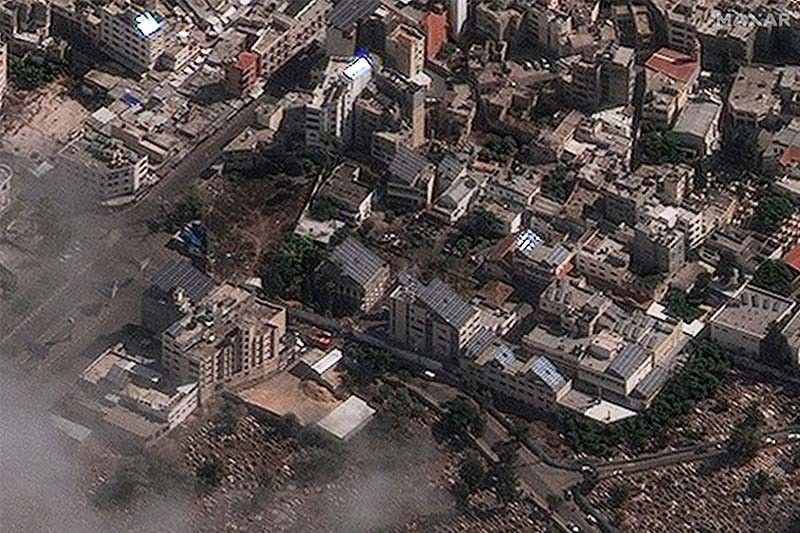What we know about Gaza hospital strike

PARIS, France — Israelis and Palestinians have traded blame for a deadly strike on a Gaza hospital this week, with the number of deaths given ranging from dozens to nearly 500.
World leaders have condemned the strike and protests have erupted in Arab countries and the wider Muslim world amid stark disagreement over the toll and who is responsible.
Here is what we know.
What happened?
At around 8:00 pm (1700 GMT) on Tuesday, the health ministry in Gaza said an Israeli air strike had hit the Christian-run Ahli Arab hospital in central Gaza City.
Israel denied it was responsible, pinning the blame on a misfired rocket aimed at Israeli territory by the Palestinian militant group Islamic Jihad from near the hospital.
Hamas has dismissed Israel's position, which received support from US President Joe Biden, saying its "outrageous lies do not deceive anyone".
The Gaza health ministry said at least 471 people had been killed in the strike and more than 300 wounded, some in critical condition.
But the US intelligence community has estimated there were likely 100 to 300 people killed in the strike, and a senior European intelligence source told AFP he believed the death toll was 50 at most.
Israeli army spokesman Jonathan Conricus also disputed the Hamas-run ministry's figures, asking "where are all the bodies?"
AFP correspondents saw dozens of bodies at the scene, with medics and civilians recovering bodies wrapped in white cloth, blankets or black plastic bags.
Bloodstains and torched cars could be seen in the hospital courtyard.
Images of the hospital after the strike published by the Maxar satellite monitoring group show the hospital buildings mainly appeared to be intact.
Maxar said their images reveal "a probable discoloured blast area in the main parking area of the hospital compound" with no "significant structural damage to the adjacent buildings".
Violence has spiralled since Hamas militants stormed across the border into southern Israel on October 7 and shot, stabbed and burnt to death more than 1,400 people, mostly civilians, according to Israeli officials.
At least 3,785 people have been killed in the Gaza Strip since Israel launched a ferocious air and artillery bombardment in retaliation, according to the health ministry.
Tens of thousands of families have sought refuge from the bombardment in and around Gaza's overwhelmed hospitals.
What do both sides say?
While Hamas said the damage came from an Israeli air strike, the Israeli army said militants from another Islamist group -- Islamic Jihad -- had caused the explosion with a misfired rocket.
"The evidence -- which we are sharing with you all -- confirms that the explosion at the hospital in Gaza was caused by an Islamic Jihad rocket that misfired," military spokesman Daniel Hagari told a press conference in Tel Aviv.
He said Israel's trajectory analysis showed the rockets were fired "in close proximity to the hospital".
Speaking in a video released on Wednesday, Conricus said that footage from the site showed too little damage to nearby buildings and too small an impact crater for an Israeli strike.
"When a big bomb, like the ones we use, hits the ground it creates a very big crater," he said, adding: "Why isn't there a big crater? Because it wasn't an Israeli bomb".
The spokesman said the level of fire damage was instead indicative of a rocket, saying of the hospital courtyard: "this is exactly what a rocket impact site in Israel looks like".
Islamic Jihad has said Israel was only trying to evade responsibility for the deaths.
"We therefore affirm that the accusations put forward by the enemy are false and baseless," the group said.
Hamas said Israel "is directly responsible for this horrific massacre which was carried out... with American weapons only the occupation possesses".
Israel has also denied that the explosion was caused by its Iron Dome missile defence system, saying the system is not used to "intercept rockets inside Gaza", but rather to prevent them from hitting Israeli territory.
How has the world reacted?
US President Joe Biden, on a trip to Israel to show solidarity, said he was "deeply saddened and outraged" by the hospital explosion and backed Israel's account.
"Based on the information we've seen to date, it appears as a result of an errant rocket fired by a terrorist group in Gaza," he said, after a meeting with Israeli Prime Minister Benjamin Netanyahu in Tel Aviv.
According to the US intelligence document provided to AFP, "Israel probably did not bomb (the) Gaza Strip hospital", and the United States is continuing "to work to corroborate whether the explosion resulted from a failed PIJ (Palestine Islamic Jihad) rocket".
It estimated the number of people killed to be at the "low end of the 100-to-300 spectrum".
Governments in Arab countries and the wider Muslim world have meanwhile overwhelmingly backed Hamas's account of the hospital deaths, expressing outrage at Israeli strikes on civilian populations.
Even countries with diplomatic relations with Israel, such as Jordan and the United Arab Emirates, blamed Israel for the strike.
From Tehran to Tripoli, thousands have joined protests against Israel following calls for a "day of rage" across the region.
Governments in Europe have condemned the strike, but without attributing blame.
EU chief Ursula von der Leyen said there was "no excuse for hitting a hospital full of civilians" in Gaza, but did not apportion blame for the blast.
Russia described the strike as a "crime" and an "act of dehumanisation", calling on Israel to provide proof it was not involved.
- Latest
- Trending




























